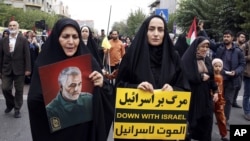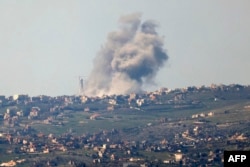Iran has tried to use the Israel-Hamas war in Gaza to consolidate its influence in the Middle East through its sway over proxy militias in the region, say analysts. The analysts, however, question what, if anything, Tehran would stand to gain by helping the nearly five-month-old conflict to spread and intensify.
Lebanese analyst Patricia Karam says Iran sees the conflict as an opportunity to exert more of its influence over its Shiite proxies in the Middle East. Iran is part of a so-called Axis of Resistance, referring to groups in the region with varying levels of military and political proximity to Tehran.
She notes the increased anti-Israel sentiment in the Middle East because of the war between Israel and Iran-backed Hamas, sparked by the militant group’s surprise attack October 7 on southern Israel, and Israel’s military response.
She says it is now harder for signatories to the Abraham Accords with Israel, like the United Arab Emirates and Bahrain, to cooperate with Israel, given the staggering scale of death and destruction in Gaza and the worsening humanitarian situation in the Palestinian enclave. The accords were designed to normalize ties between Israel and some Arab nations.
In addition, she notes that the conflict has put a snag in efforts to normalize ties between Israel and Saudi Arabia.
Karam adds that Iran will suffer badly should the conflict worsen, especially with respect to Israel’s northern neighbor, Lebanon. Iran-backed Hezbollah is based in Lebanon.
“This attack has re-energized the regime’s resistance narrative throughout the region, but it’s unclear how much Iran would gain from the conflict worsening, especially that (Lebanon’s) Hezbollah is an important asset for it which it does not want weakened,” she said. “Exchanges on the Lebanon-Israel border continue. But there is always the danger that this balancing act could collapse, whether by miscalculation or deliberate decision. The existing tit-for-tat could really escalate.”
Michael Young, writing in the Carnegie Middle East Center’s online Diwan publication says, “Yet for all the recognition of Iran’s growing regional sway, one thing is equally evident. Wherever the Iranians have asserted their power, the results have been catastrophic. Observers have described the pro-Iran network of regional political-military actors as an ‘axis of resistance,’ but the reality is that everywhere it is primarily an axis of ruin.”
He also says, “The Iranian model has bolstered Iran’s power but left Arab societies in misery.” He points to devastating Iran-backed wars in Syria and Yemen, while Iraq is now dominated by pro-Iran militias that “have prevented the emergence of a functional state and undermined elections.”
Young, who is based in Beirut, adds, “In Lebanon, Hezbollah has protected a political class that brought on an economic collapse while derailing economic reforms; and in Gaza, Iran’s allies have caused a war that has ravaged the territory.”
Young questions whether Iran will ever agree to ultimately disarming its Arab allies, like Hezbollah.
David Hale, a Global Fellow with the Wilson Center in Washington and former U.S. ambassador to Lebanon, said during a recent webinar the United States should confront Iran directly. He stopped short of calling for an active toppling of the regime in Tehran.
“Typically, in Lebanon and this now as well in Gaza and the rest of the region, is that we in our strong desire to avoid escalation into a regional war, we tend to focus on the proxies of our enemies,” he said. “Today it’s Hezbollah, the proxy of Iran. So, if you don’t have a strategy that addresses the mastermind – Tehran – then your strategies to deal with proxies are only going to get you so far.”
Meanwhile, Iran has warned that a direct confrontation between it and the U.S. is becoming likelier as long as the Israel-Hamas war continues.
U.S. diplomat Amos Hochstein visited Beirut Monday, hoping to de-escalate hostilities along the Lebanese-Israel border in a bid to stop an even bigger confrontation from happening.
VOA’s Patsy Widakuswara contributed to this report.





